Sensitive skin has its own unique needs, and there’s no denying it. We’re here to help if your skin is constantly feeling tight, red, dry, flaky, or irritated and you can’t find organic skincare routine for sensitive skin that doesn’t cause a chain reaction.
These Best facial products for sensitive skin tips will help you choose the best Best facial products for sensitive skin by explaining what causes sensitive skin to soothing and protecting your complexion.
Table of Contents
Best Facial Products for Sensitive Skin
Finding the right organic skincare products can be challenging, especially for those with sensitive skin.
However, organic skincare is a viable option for this skin type. Organic ingredients are known to offer nourishment and calming effects, making them great for delicate complexions.
In this blog post, we will delve into the world of the Best Anti Aging Facial Kit for All Skin Types for sensitive skin and discuss various products that are available.
Additionally, we will provide tips on selecting the best products for your needs and creating a successful routine, while also pointing out common mistakes to avoid.
If you are interested in adopting more natural solutions for improving your complexion – then read on!
To achieve an adorable beauty with never-ending charm, you need to implement this easy homemade skincare routine. It involves eight steps.
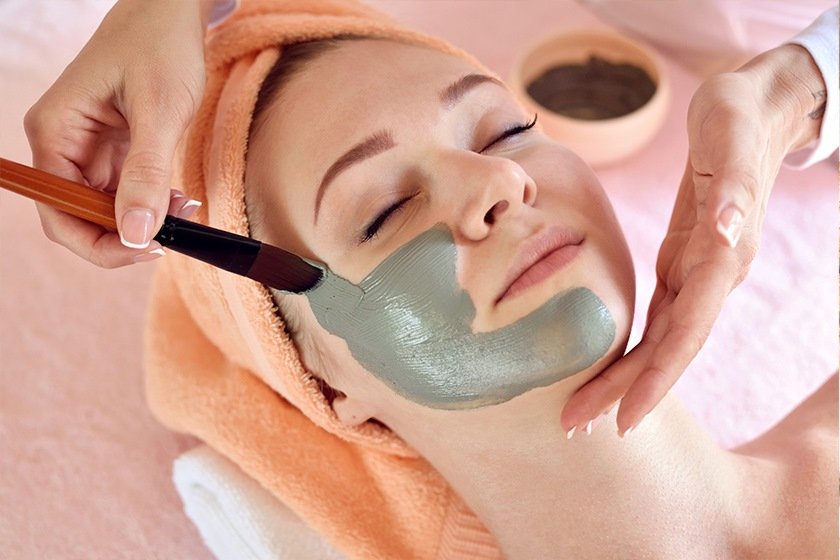
1. Cleanse
It is imperative that you wash your face in the morning and evening to remove dirt and impurities. Let’s explore which homemade face cleansers are effective and how to prepare them.
Milk
- Milk is not only good for your bones and nourish your body, but it’s also good for your skin.
- It’s even known to be a natural cleanser and acne treatment.
- A whipped egg or aloe vera gel can be substituted for the milk and add-in. Apply it to your face once it has been mixed properly.
Rose Water
- This is the greatest DIY face cleanser you’ve ever used, thanks to the sophisticated face-cleaning capabilities of the rose water.
- Utilizing a cotton ball, massage it to your skin. Don’t rinse it off for the following thirty minutes.
Green tea
- Antioxidants and anti-inflammatory properties of green tea make it an excellent addition to a homemade morning face routine.
- Let your green tea cool completely before drinking it. Two to three tablespoons of cooled green tea should be mixed with one spoonful of honey.
- Apply the mixture to your face with a cotton pad or your fingertips.
2. The exfoliation process
With homemade exfoliators, it is easy to achieve naturally smoother, healthier skin with a daily organic skincare routine.
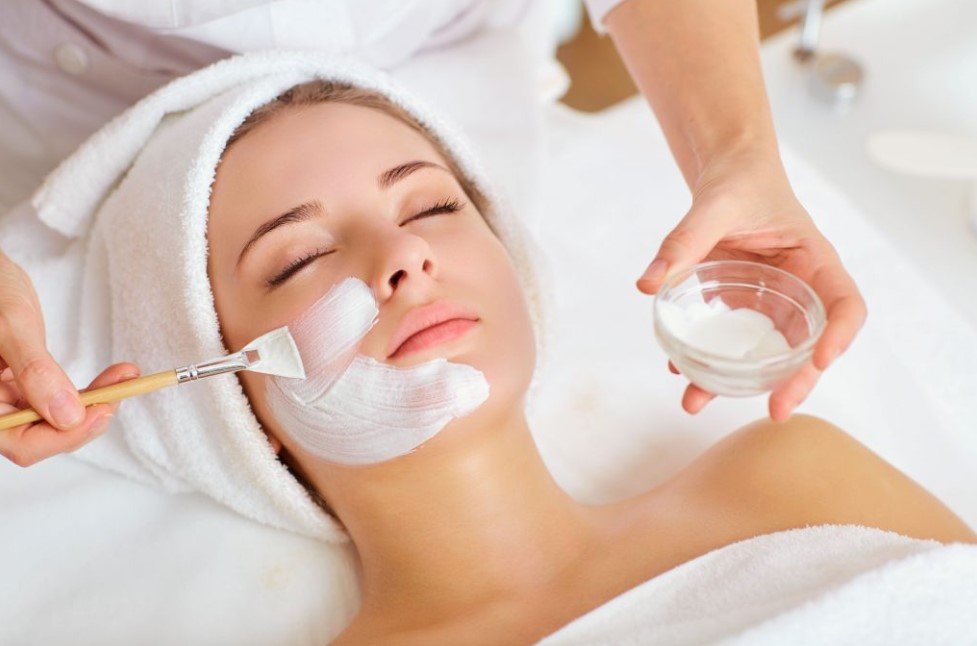
Coffee Grounds Scrub
- Coffee grounds contain antioxidants and caffeine that help exfoliate dead skin cells, improve circulation, and brighten the skin.
- Combine used coffee grounds with coconut oil or water to make a paste.
- Apply the mixture over your skin in circular motions, paying special attention to areas that need exfoliation.
Lemon and Sugar Scrub
- Sugar physically exfoliates the skin, while alpha-hydroxy acids (AHAs) in lemon juice brighten and exfoliate the skin from within.
- The mixture should be applied to damp skin and gently massaged in circular motions. Rinse with warm water.
Baking soda
- In addition to removing dead skin cells, baking soda balances the pH level of the skin.
- To make a paste, combine 1 tablespoon baking soda with enough water.
- Circular motions should be used to massage the paste onto damp skin.
3. Face Mask
Indulge in the nourishing benefits of homemade masks crafted from wholesome ingredients for a spa-like experience at home.
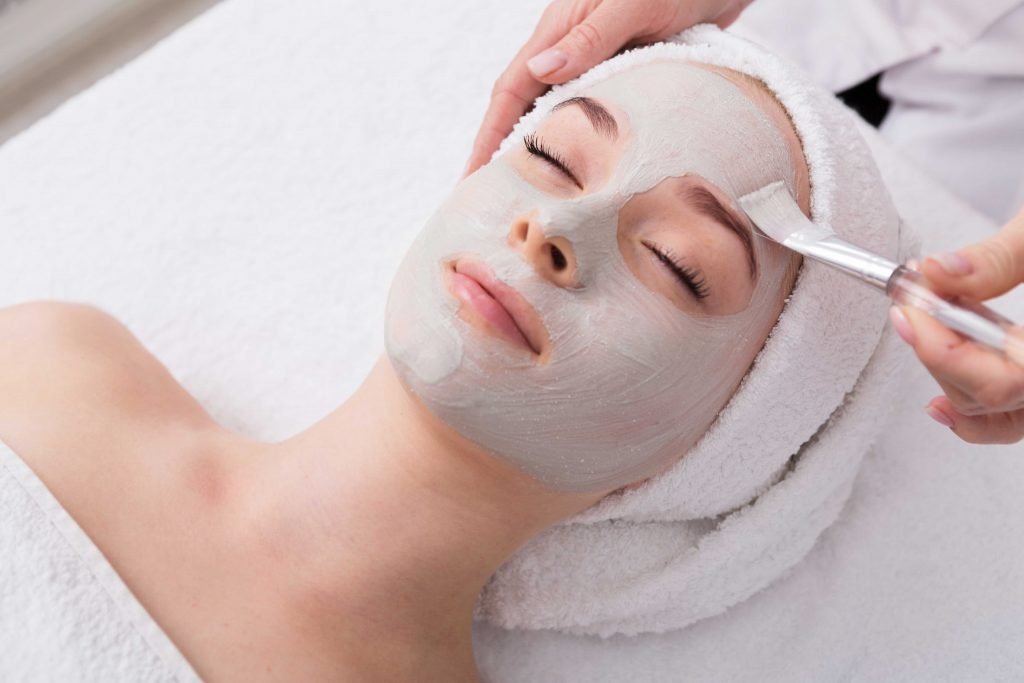
Turmeric and Yogurt
- Yogurt calms and moisturizes the skin, while turmeric has anti-inflammatory and brightening properties.
- Mix one teaspoon of turmeric powder and two tablespoons of plain yogurt in a bowl.
- Add 1 tsp honey for added hydration and antimicrobial benefits. When putting it to your face, keep your eyes out of the mix. After ten or fifteen minutes, wash it off with warm water.
Rosewater and Sandalwood
- While sandalwood is anti-inflammatory and antibacterial, rosewater hydrates and tones the skin.
- Make a paste by mixing 1 tablespoon of sandalwood powder with enough rosewater.
- void the eye area when applying the mixture to your face. For 10–15 minutes, leave it on.
Aloe Vera and Coconut Oil
- Coconut oil stimulates and moisturizes the skin, while aloe vera soothes and hydrates it.
- Combine two teaspoons of fresh aloe vera gel with one spoonful of coconut oil. Spread the mixture over your neck and face.
- For fifteen to twenty minutes, leave it on. After washing, rinse with lukewarm water.
4. Tone
The purpose of using skin toner is to prevent dead cells from accumulating on your skin.

The purpose of applying toner after face cleansing is to dislodge the ultimate traces of dirt, grime, and other toxicities that are beneath your pores. The toner completes the entire face cleansing process.
Rice Water
- Despite sounding crazy, the moment we found out rice water works well as a toner, it was an incredible discovery.
- Designed to help with skin cleansing, this toner is an excellent exfoliator that eliminates all the remaining residues. People with dry skin can choose this toner without feeling any stress.
- Add 1 cup of rice to a bowl. Wash the rice until the water turns cloudy. Pour the water into a bottle and add the rice again.
- After mixing everything together, let it sit for a night. Transfer the rice the next morning, and the water is ready for use. You can also store the cotton ball for future use.
Apple Cider Vinegar
- As well as adding taste to your dishes, this kitchen nutrient has skin benefits that help fight dead skin cells and sunburns and balance the natural PH level of your skin.
- Combine two tablespoons of cider vinegar with four tablespoons of distilled water in a bowl.
- Be sure to mix it properly and refrigerate it. Put a cotton ball on your face after the mixture has cooled. Toner leftovers can be stored for future use.
Aloe vera gel
- The aloe vera gel helps you not only as a cleansing agent, but also as the best toner, which is suitable for combination skin types.
- You can apply aloe vera gel directly to your face or mix it with orange juice. Put the whole mixture in the bottle to be refrigerated.
- After 4 to 5 hours, you can use it as a toner to cleanse your skin. Natural skin toners are great for exfoliating, cleansing, and nourishing your skin, leaving it glowing and healthy.
5. Serum
With our top picks of natural serums, you can give your skin a wholesome DIY skincare routine to maintain elasticity and firmness.

Argan Oil and Lavender Oil
- In combination with lavender oil’s calming properties, argan oil hydrates the skin and soothes inflammation.
- Add 3-5 drops of lavender essential oil to 1 tablespoon of argan oil. Store in a dark glass bottle after shaking well. Nightly, apply a small amount to the face and neck.
Coconut Oil and Rose essential oil
- Promotes cell regeneration and reduces inflammation while moisturizing and softening the skin.
- Combine 1 tablespoon of coconut oil with 5 drops of rose essential oil. Apply a small amount daily to the skin. Store in a dark glass bottle.
Hemp Seed Oil and Sandalwood Oil
- Promotes a youthful complexion and reduces signs of aging by soothing inflammation and irritation Add 5 drops of sandalwood essential oil to 1 tablespoon of hemp seed oil.
- Apply a small amount of this Night Cream for Hyperpigmentation to the skin every night in a dark glass bottle. Make sure you apply the face serum twice a day after cleansing.
6. Eye Cream
If you want to get rid of dark circles and ageing signs, use an eye cream in your daily skincare routine. Hmm, making eye cream at home is quite difficult. But we have another solution.

Shea Butter and Almond Oil
- Combines shea butter with almond oil to minimize wrinkles and increase skin suppleness.
- Put one tablespoon of shea butter in a double boiler to melt it. Spread 1 tsp almond oil on it. Once it cools, transfer to a jar for regular usage.
Coconut Oil and Vitamin E
- With coconut oil’s moisturizing properties and vitamin E’s antioxidant properties, dark circles and puffiness are reduced.
- Combine 1 tablespoon of coconut oil with 2 capsules of vitamin E. Paste should be creamy. Apply gently around the eyes after storing in a jar.
Green Tea and Aloe Vera Eye Cream
- Aloe vera’s soothing properties and green tea’s anti-inflammatory properties reduce eye fatigue and rejuvenate the eye area.
- Mix 1 tablespoon of aloe vera gel with 1 tablespoon of cooled green tea.
- For additional nourishment, add a few drops of vitamin E oil Apply daily with a gentle tapping motion after storing in the refrigerator.
7. Moisturize
A moisturizer hydrates, protects, and maintains the skin’s natural barrier function. It prevents dryness, irritation, and premature aging while promoting smooth, supple skin.

Aloe Vera Gel
- Hydrating, soothing, and anti-inflammatory, aloe vera gel is excellent for sensitive or irritated skin.
- It heals wounds, reduces redness, and provides long-lasting hydration. Using fresh aloe vera leaves or store-bought gel, scoop out the gel.
- Every day, apply a thin layer to your face and neck and allow it to absorb completely.
Coconut Oil and Vitamin
- Smooth and supple skin is restored and nourished with vitamin E, which also cures dry, damaged skin.
- Deeply hydrating, the oil shields the skin from free radical damage thanks to its antioxidant content.
- In a little container, combine equal parts coconut oil and vitamin E oil. Blend well and apply a small amount to your body and face. Till it absorbs, rub lightly.
Rose Water and Glycerin
- Skin that has been moisturized by glycerin feels smooth, supple, and renewed. Rose water soothes irritation and moisturizes the skin.
- Pour equal amounts of glycerin and rose water into a clean container. Apply a tiny amount to your face and neck using your hands or a cotton pad, and gently pat until absorbed.
8. Facial Oil
With our 3 best natural facial oil blends, you can enjoy the rejuvenating benefits of natural ingredients tailored to your skin’s needs while maintaining skin hydration and nourishment.

Tea Tree Oil (Oily Skin)
- The inherent antibacterial qualities of tea tree oil can help oily skin by controlling oil production and minimizing acne.
- It is recommended to dilute tea tree oil with a carrier oil, such as coconut or jojoba. Apply sparingly to clean, dry skin, paying particular attention to oily or breakout-prone areas.
Avocado Oil ( Dry Skin)
- The fatty acids and vitamins in avocado oil make it deeply nourishing for dry skin.
- To dampen the skin after cleansing, apply a few drops of avocado oil. Massage it gently upwards until it is fully absorbed.
Jojoba Oil
- Jojoba oil moisturizes without clogging pores since it resembles the skin’s natural sebum.
- After cleansing, massage jojoba oil onto dry, clean skin. Work it into your skin gently until it is absorbed.
9. Sunscreen
- Including sunscreen as the last step in your homemade skincare routine offers vital defense against UV harm, maintains the effectiveness of your products and routine, and lowers the chance of skin cancer.
- It is an indispensable element of your daily skincare routine and overall skin well-being that cannot be replicated at home due to its chemical composition, which aids in protecting your skin from sun damage.
- Remember to choose a sunscreen with a minimum SPF of 50 PA++ for maximum protection from the sun’s rays.

Steps for Following This Organic Skincare Routine for Sensitive skin
Follow this natural skincare homemade routine in the morning:
- With the same homemade face cleanser, walk to the bathroom.
- Make a homemade skin exfoliator by washing your face properly and wiping it out.
- Get a glowing finish by using the face mask once or twice a week.
- Allow the skin toner to seep into your skin.
- Apply the natural face serum now.
- Place any alternatives to eye creams discussed there for the same period of time.
- Apply the moisturiser to your face after that.
Benefits of Organic SkinCare Routine for Sensitive Skin
- Organic Skincare products with natural ingredients, non-toxic formulas, and avoiding harsh chemicals are becoming increasingly popular among those with sensitive skin.
- Organic skincare routine for sensitive skin are crafted with carefully chosen natural ingredients that offer gentle yet effective benefits.
- These plant-based components, such as essential oils, botanical extracts, vitamins, minerals, and naturally derived compounds, provide nourishment to the skin without causing irritation or harm.
- Additionally, numerous organic skincare brands prioritize sustainability in their manufacturing methods, which lessens environmental impact while maintaining top-notch results.
- Organic skincare products are made with non-toxic formulas that are free from synthetic fragrances, dyes, parabens, and sulfates.
- These ingredients can cause irritation and sensitivity in certain skin types, as well as strip away moisture and lead to breakouts.
- Instead, organic skincare companies use natural preservatives like vitamin E oil or rosemary extract to maintain the freshness of their products while upholding safety standards.
- The main advantage of organic skincare is that it doesn’t expose your delicate skin to harsh chemicals like alcohol, phthalates, and parabens found in conventional beauty products.
- The benefits of using organic products are that they are safe and free of potential irritants, while still providing great results.

What causes sensitive skin?
A sensitive skin type can experience periodic sensitivities, such as stinging, itching, tightness, redness, or dryness.
Some people are genetically predisposed to sensitive skin, others can become sensitized. Damage to the skin barrier is the common factor. One of the body’s first lines of defense is the skin barrier.
Types of Organic Skincare Routine for Sensitive Skin
Toners and Cleansers
If you have sensitive skin, cleanser and toner are essential components of your skincare routine. Look for a toner or cleanser that is free of harsh chemicals like parabens, sulfates, and fragrances when choosing an organic cleanser.
Choose a gentle formula that will not strip the skin of its natural oils while effectively removing dirt and makeup. Aloe vera soothes the skin after cleansing.

Serums and moisturizers
Moisturizers not only seal in moisture, but they also include active components like antioxidants and hyaluronic acid, which nourish your skin.
If you have skin that is sensitive, consider a lightweight solution that is free of scents and colors that might irritate the delicate skin around your eyes and other sensitive regions.
Jojoba oil is a fantastic choice for oily skin since it controls oil without clogging pores.
Using masks is an effective method for nourishing your skin with additional nutrients. Along with this, exfoliation is beneficial in eliminating dead skin cells from the surface of your face.
These cells can lead to dullness if left unchecked. For sensitive skin, organic masks are a great option as they contain gentle ingredients such as honey or clay that effectively remove impurities trapped deep within pores without causing irritation.
When it comes to exfoliation, opt for a mild scrub that uses natural grains rather than harsh chemicals, which may worsen inflammation in already sensitive complexions.
The benefits of organic skincare products are that they soothe irritation and reduce redness.
To find the best organic product for your individual needs, you need to consider your skin type and read labels carefully. Next, we’ll talk about how to choose the right organic skincare routine for sensitive skin.

Tips for Selecting the Best Organic Skincare Solutions for Sensitive Skin
There are a few key things to remember when selecting organic skincare routine for sensitive skin. It is important to carefully read labels and ingredient lists when selecting organic products.
It is also important to choose formulas that are natural, non-toxic, and do not contain harsh chemicals like parabens, sulfates, or phthalates. Also, choose formulas that are non-comedogenic so that they do not clog pores or cause breakouts.
The type and needs of your organic skincare routine for sensitive skin also important when selecting organic skincare products.
If you have dry or combination skin, choose lightweight moisturizers with hydrating ingredients like aloe vera or jojoba oil.
Using gentle cleansers with salicylic acid or tea tree oil can help reduce inflammation and control excess sebum production on oily or acne-prone skin without stripping it of moisture.
Before purchasing any product, read reviews to see how well it works on other people’s sensitive skin types. This will give you a better understanding of its performance and help you save time and money in the long run.
It is important to read labels and ingredient lists carefully when choosing organic skincare products for sensitive skin, to look for noncomedogenic formulas, and to consider your skin type and needs when choosing organic skincare routine for sensitive skin products. Follow the steps below to create an effective organic skin care routine for sensitive skin.
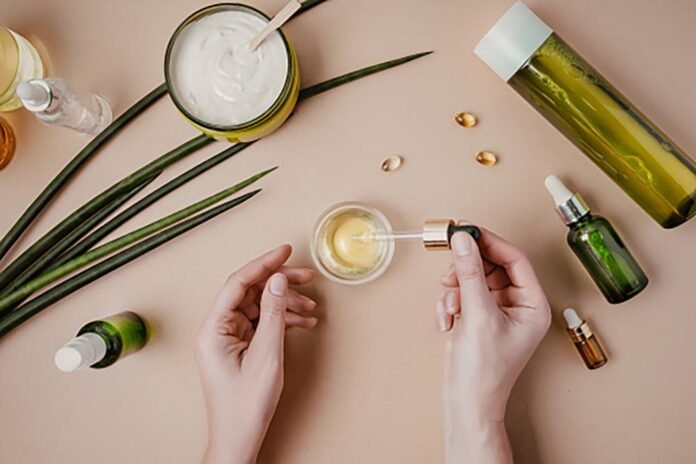
What is the Best Organic Skincare Routine for Sensitive Skin?
In order to achieve healthy, balanced skin, it’s important to understand the basics of organic skincare and how it can benefit sensitive skin.
Gently cleanse your face twice daily with a mild cleanser or toner
You should choose a cleanser or toner with natural ingredients like aloe vera, green tea extract, and chamomile extract when you have sensitive skin.
These ingredients offer profound cleansing benefits while being gentle on the skin.
Look for non-comedogenic formulas that won’t clog pores and cause breakouts, and avoid harsh chemicals like sulfates, which can strip the skin of its natural oils and leave it dry and irritated.
Hydrate and nourish the skin with a lightweight moisturizer or serum
If your skin is sensitive, moisturizing is essential as this keeps moisture locked in and keeps your complexion hydrated without becoming oily or greasy during the day.
You can nourish your skin without leaving behind a heavy residue by using lightweight moisturizers and serums made with natural ingredients like jojoba oil, shea butter, avocado oil, and rosehip seed oil.
As fragrances can irritate delicate complexions even more, avoid them as well.
Use a gentle scrub or mask once or twice a week to exfoliate
Exfoliation is key in removing dead skin cells and promoting a brighter complexion.
However, for those with sensitive skin, caution must be taken not to aggravate it further.
Opt for a gentle scrub with natural exfoliants like oats or sugar granules, rather than harsh options such as walnut shells, which can be too rough for delicate skin.
Another option is to use a mild clay mask once a week instead of physical exfoliants.
An effective organic skincare routine for sensitive skin can be created if you follow a gentle cleansing, moisturizing, and exfoliation routine using organic skincare products tailored to your skin type.
When using organic products, you should also be aware of common mistakes that could harm your skin.
What are some common mistakes to avoid when using organic skincare products on sensitive skin?
Utilizing organic skincare products can have positive effects on sensitive skin, but it’s crucial to avoid pitfalls that may result in irritation or other issues.
One of the most common errors when using such products is over-exfoliating or over-cleansing the skin.
While exfoliation serves to eliminate dead cells from the surface of your skin, excessive exfoliation can remove natural oils, causing dryness and discomfort.
Similarly, cleansing with harsh products more than twice a day can also lead to inflammation and irritation. For optimal outcomes, it’s recommended to stick to gentle cleansers or toners and limit usage to no more than twice daily.
Those with sensitive skin often make the mistake of not applying sunscreen regularly when using organic skincare products.
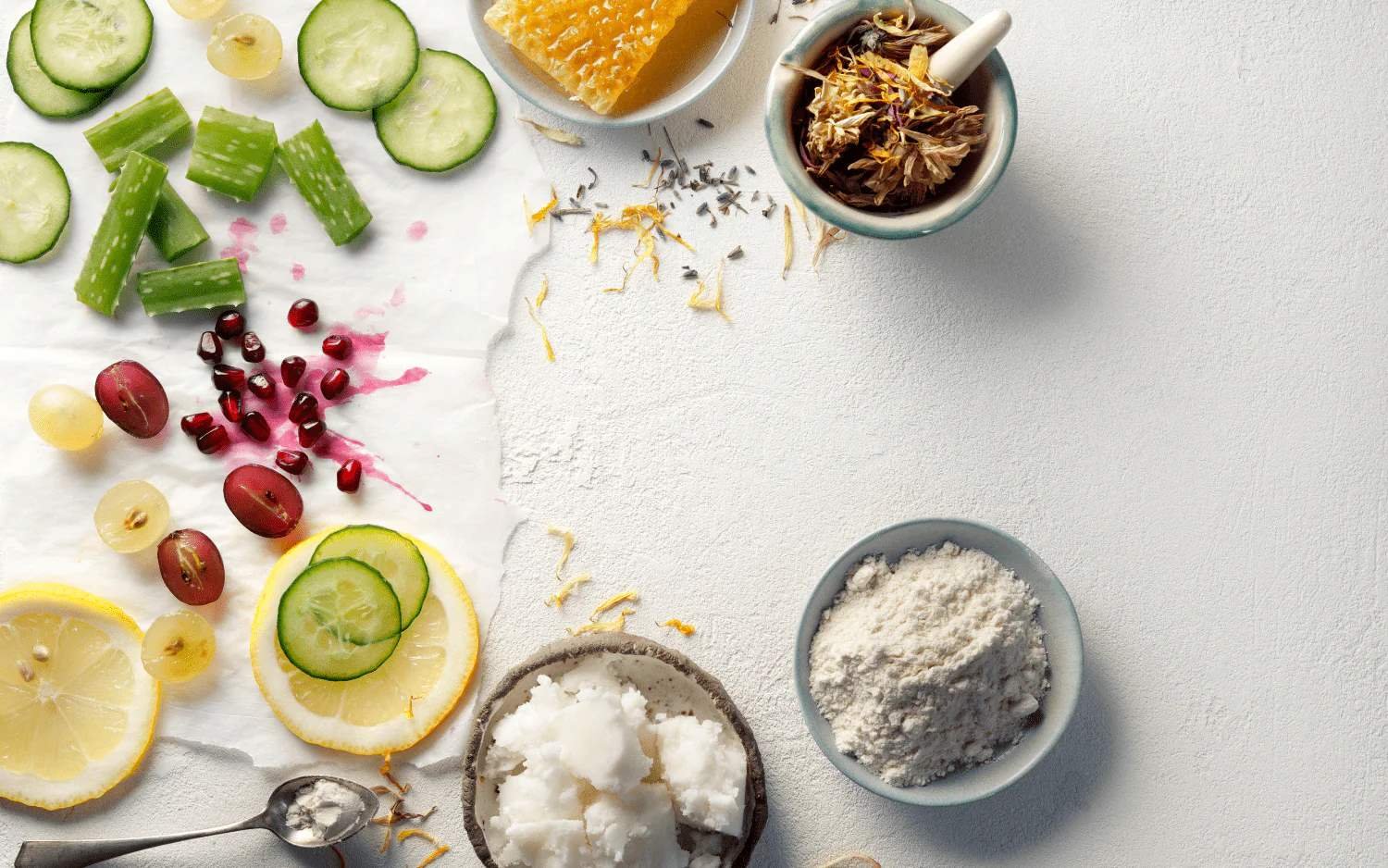
UV rays can damage all types of skin, especially those with eczema or rosacea, so sunscreen can help protect them.
For optimal protection throughout the day, apply a broad spectrum SPF 30+ sunscreen every morning before leaving home.
Organic skincare is beneficial for individuals with sensitive skin. It’s crucial to select a suitable product that meets your specific needs and develop a personalized skincare routine.
To reap the maximum benefits from your organic skincare routine for sensitive skin, it’s important to steer clear of common mistakes like using excessive products or not patch testing beforehand.

With proper skincare, organic skincare routine for the Best facial products for sensitive skin can help you attain a radiant and nourished complexion without any irritation or discomfort.
If you are looking for natural and organic skincare products that are gentle enough for sensitive skin, and want the latest organic ingredients, tailored skincare routines, and results-driven solutions, then look no further!
We strive to provide our customers with the highest quality items at competitive prices.
We have a wide range of safe, effective, and affordable options. Visit us today to learn how we can help you achieve better skin.
Read Next

